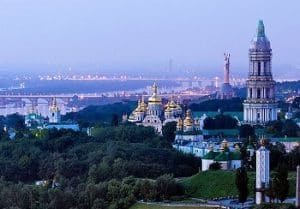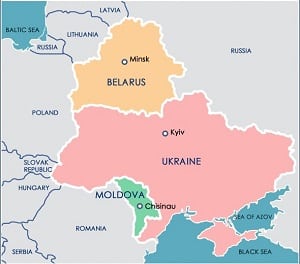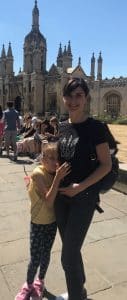
Call it a woman’s intuition, but for a week I had been fearful that something was about to happen. I spoke about my apprehensions to Alex, my husband, even suggesting that we should prepare to leave. He dismissed my fears saying nothing is going to happen, this is no time to start a war. Thursday, 24th of February 2022, at 5 in the morning, we heard explosions and bombs going off and we knew, the war had started. And so did my journey.
I was born in Kyiv, grew up and lived there all my life. My parents, my brother 10 years older than I and his son all lived in the city. I am a Human Resource professional and have more than 20 years of experience, holding various positions in Bank Management, Telecommunication and Events Management fields. Alex and I have been married for close to 9 years and we have a 7-year-old daughter, Solomiia. Alex is an IT professional and works in the area of business analysis. Until now, my travels outside of Kyiv were brief as a tourist. Now, it has been close to 8 months that my daughter and I have been away from home, from all my family. Alex cannot be with us because the majority of men are not permitted to leave Ukraine till the end of the war.
That day Alex and I contemplated leaving Kyiv. There were air raid alarms all day and the news around was of extreme danger. Every time the alarms went off, we had to rush down to our basement parking. Solomiia was terrified and so was I. We didn’t know what to expect, each moment, every day. The bombings were becoming more frequent and coming closer. Alex suggested we go to his parent’s place in Cherkasy with both our parents and nephew (Cherkasy is a large city in the nearby region of central Ukraine). We left for Cherkasy almost as soon as the war broke out, hoping the conflict would be resolved soon. But things just got worse, more distress signals, more combats and more deaths. One of my parents’ neighbours, a young soldier of 35, with no family but a widowed Mother, died. She received the news that his death was confirmed, but she and we kept hoping he would return. His Mother is devastated, though holds up bravely with the support of my Mother.
The situation in the country was very unpredictable, with news about the deaths of adults and children becoming more frequent every day. Alex was worried about the safety of our lives, especially mine and Solomiia’s and he proposed that we go to Munich where one of his cousins lives. I didn’t want to leave my husband, my family and my home. It was the hardest decision of my life. But my husband firmly insisted because the future of our child depended on this decision. Therefore, with tears in our eyes, we left Cherkasy. Alex drove us to the Moldavian border at the beginning of March; he wanted to accompany us but he was stopped, something we had expected. I had prepared myself that I would have to go alone with my daughter, that I must leave without him. From the Moldavian border, volunteers drove us to Romania which was only 40 kilometres away. And there were many volunteers to assist families like ours. We flew to Munich from the city of Iasi in Romania.

Solomiia and I spent one week in Munich. Those were very difficult and stressful days. I lived in constant fear for my husband and family, troubled by thoughts of their possible danger in Kyiv. Were they alright or were they affected? I discovered that it was very difficult to rent an apartment in Munich or stay on my own with my daughter. I did not want to be a burden on our cousin whose hospitality I felt we had overstayed. Alex kept urging me on, “You have a daughter to protect. Solomiia is so young and must be sheltered. Everything will be alright.”, he said each time we spoke.
My brother has a large number of friends all over the world. While I was in Germany, he offered me an apartment in Riga (Latvia) that the volunteers had found and rented. My parents and nephew were already there, having been taken by my husband from Cherkasy to the Polish border from where they came to Riga. My daughter and I joined them in the middle of March. We received a lot of support from Latvians, and many of them became our friends. We are very grateful to them for everything. Our countries have many common values. Alex and my brother were left behind. I spoke to them every day. It was not easy.
I
For the first few months of the full-scale war, practically everything had come to a standstill. Businesses closed down and many lost their jobs. In March, all of us took voluntary leave without pay. Everything was uncertain and people did not know what to expect. Never had our country faced anything like this before. After about 3 months, however, things gradually limped back to normal. Online work resumed. My husband’s clients are all around the world so he went back to providing them with support services. He feels a sense of responsibility and duty towards his homeland. Therefore, he must stay in Ukraine. He supports our country and is ready to defend it.
All places of entertainment like cafes, and restaurants shut down as soon as the war broke out. Some of them switched to making food for free for people in the most destroyed cities. As for daily provisions, they depended on cities. Kyiv received a lot of assistance from countries globally and after a few weeks, there was enough for most people. But cities under Russian occupation were in dire conditions, often running out of drinking water. Then people from other regions came to their help. Ukrainians are all very well connected and always ready to come to each other’s aid. War has only intensified the unity among citizens. Older women, mothers of soldiers, knitted nets that can be used as covers to camouflage equipment and provisions of the Ukrainian forces. They also prepared long-term food for soldiers at the front line.
We lived in mortal fear as news of deaths came in every day, horror stories. More than 400 children had been killed (official statistics in October 2022) and more than 5,500 civilians lost their lives (official statistics in September 2022) so far. Each story is heartbreaking and we know that this statistics is not final. There have been many sad stories, as information that came in after the liberation of occupied lands showed evidence of many crimes committed during combat.
II
Solomiia and I returned to Kyiv from Riga at the beginning of May to see our family and to change our clothes from winter to summer wear. By now the cafes and restaurants had opened and there was a sense of normality. I thought we would stay on but I found to my dismay that air raid alarms and sirens continued and we had to take shelter. Then news reached that thousands of Russian soldiers had arrived near the Belarus border which was very close. I was now very apprehensive that they would renew their attack on Kyiv.
My daughter finished school by the summer and was due to start again in the fall. During the war, schools were not safe. Every time the siren sounded, the children had to run to the bunker. I was traumatised by the thought that my child would have to run this way to safety without me. Alex saw how worried I was and said that it was still not safe there and we had to leave again. In the spring we hoped that everything would be over soon and sought shelter for a short time. But now we realised that the war would last no one knows for how long, so we had to make a long term decision. We had to choose a country in which it would be safe and comfortable for our child to live. Latvia was not suitable because it has borders with Russia. There are many Russians in Latvia. I can speak Russian, as can my daughter, but the accents in Russian and Ukrainian are different. I was afraid that the Russian army might soon approach Riga. The Latvians also did not exclude this, they believe in NATO, and yet they were afraid.
I confess that my anxieties were psychological, that I could not control my fears and suspicions. We have many relatives in Russia and they all support the regime and President Putin. We were forced to stop communicating with them, because every time we did after the start of the war, they told us: “Your President, language, viewpoint, choice, and culture are bad, and WE want to change all of you around.” We wondered why they should tell us what to do. This is our President, our language and all the rest and it depends on us who we choose and what to do. If you look at the history of relations between Ukraine and Russia, you can see that conflicts and war between the countries have been going on for more than 300 years. All this time, Ukraine has been fighting for its full independence. Kyiv is a medieval city, which is more than 1500 years old; Moscow is about 800 years old.
My cousin who is Ukrainian and was born in Ukraine now lives in Russia and refuses to listen to any other news channel but the one that is supported by the government of Moscow. When I last spoke to her in Spring, she was in favour of the Russian government’s politics and actions in Ukraine. We haven’t communicated since. It is difficult for me. I know if I tell her something, her response will hurt me further. In reality, many people in Ukraine have family members in Russia and the experience is the same. I have spoken to my friends who have relatives in Russia and they have faced similar animosity. Brothers, sisters, and even mothers and sons from the two countries do not understand one another anymore. The worst thing that this war has done is that it has separated our people, and our families. It is like a brother coming to my house with guns and bombs. People in Ukraine say they will not forget Russia for the violence and treachery. This hate will outlast the war by a generation.
III
After two weeks in Kyiv, we decided to move to another country that would be distant from Ukraine and Russia. I liked England because it was far but not too much. England is one of the most developed and safest countries in the world. That thought comforted me.
We learnt of the sponsor scheme in England under which an English family can invite a Ukrainian family to come and live with them for six months. There are also special provisions for visas.
We tried to find one such family. There was a Facebook page on which I posted my story and our pictures. And I heard back from Nadia and Tim who are from Cambourne. We met online; Alex, I, Nadia and Tim spoke for an hour and then we agreed that we will think it over for some time before we decide if we could live together. In 15 minutes, Nadia invited me to come and stay in her house here in Cambourne. I was happy because, in the time that we spoke, we discovered that Nadia and I shared a lot of common tastes and values. In Ukrainian, Nadia means hope and hope was what she offered me and Solomiia. We accepted her invitation.
Then, we began the visa process. I went back to Riga with my daughter and nephew, waiting for the visa to come through. This was in June. My parents decided to remain in Kyiv and be there for my brother who is alone. I felt I had to leave for the sake of our daughter. I would have stayed back had it not been for her. My husband understands. My nephew was in Riga all summer and now he is back in Kyiv to finish school. He is 16. Perhaps he will leave Ukraine again if the situation in the city gets worse.
Our visas came through in two weeks. Nadia met me at the airport. The man who checked my papers at the airport asked me where I was going and when I mentioned Cambourne, he said, ‘Oh Cambourne is one of the best places in England.’ He was very encouraging and made me feel very good.
IV
Nadia and Tim keep a beautiful home and have two wonderful children, Amalie and Austin. I wanted to be with a family with children. Both the children are intelligent, understanding and extremely nice. My daughter is very friendly and she has grown to be very fond of Amalie, who is 11. On some days, when Nadia and Amalie come with me to pick up Solomiia from school, she runs to meet Amalie. I feel somewhat ignored, but I understand Solomiia loves her like a sister.

We have been very fortunate to be with Nadia and Tim. I really appreciate what they are doing for us because I realise it is not easy for them to let complete strangers share their life, their family and home. To me, they appear saintly because only then could they have opened their doors to us in the manner they have. I like to cook for them and do something in return for all their kindness and generosity. I make something from my cuisine, something sweet. Sometimes we try to do things together. At work, I always refer to Nadia, Tim and the children as my family in England, not as my sponsors. It’s strange, but in this war, people who were close become strangers, and complete strangers become family to us.
A lot of support has come our way from Cambourne. I have been offered one year free membership to the local sports centre. I like sports and it helps me keep calm and soothe my mind. My daughter has joined the football club that she enjoys very much. There is much to do in this town and many opportunities for children. She joined the best local primary school. She found it difficult to follow the first couple of weeks. Now she loves it, though she misses her Dad and her friends in Kyiv. I have a part-time tutor for her to help with English and another to continue teaching her the Ukrainian language. We do not want to lose connection with our fatherland.
I started work as an event administrator at the University of Cambridge. It is a temporary, part-time job. I need to pick up Solomiia from school and therefore cannot work full-time. But I am very happy. I studied English very intensively during my last year in Kyiv. It was difficult because I had to combine my full-time work in the office. It took a lot of my energy and time, but thanks to my family and support, I continued. Now I get a lot of practice speaking English and fortunately have an interesting job.
Back in Kyiv, times remain uncertain. Some days are more alarming than others. People are gradually going back to their lives as routine. Many people have returned to Ukraine, having left it soon after the war, though some of them are still abroad; but this figure could change at any moment. I cannot speak for everyone – each has her own situation and circumstance. There are some people who cannot live outside of their own country, it is very hard for them to live anywhere else. It was impossible for me to live in Kyiv. I wanted to run somewhere safe because Ukraine is still not safe. Now everything is back as usual: service, offices, schools, public transport etc. But no one knows what may change and how the very next moment. The hardest time lies ahead. Winter is coming and a lot of infrastructure lies destroyed in Ukraine.
I feel my sponsors are the best people in the world and I am lucky to have found them. I will be grateful to them till my last breath. If my husband is allowed to travel, he will come and then we may be able to make our home here for some time. Alex visited the UK many years ago and he likes the country. My visa is for 3 years during which I can stay and work here. I have applied for all the documents and registrations. But my worry for my people and my nation is far from over. I really hope for a family reunion soon.
When my daughter was 1 year old, my mother-in-law came to her birthday party and gave her money in an envelope and said: “Let this be an investment for your future higher education, maybe at the Sorbonne, Oxford or Cambridge.” Who would have thought that it would be so close to our lives some years later? At the moment I am happy, living near Cambridge and working at the University. I am pleased to be part of the team of this institution. I made friends with other Ukrainian women here; they too are very grateful to their sponsors for everything. I try to believe in the future, when life will improve and we will make a new beginning.For the moment, I feel safe and at home. I owe this to the generosity and kindness of Nadia, Tim, Amalie, Austin and all the good people of the UK.
Svitlana is an HR professional who is from Kyiv and has now come to live in Cambourne, Cambridge.
